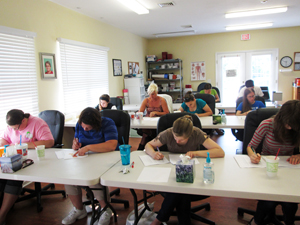About Phlebotomy Schools

You may find schools in your area by researching the following:
- Check with the various phlebotomy certification organizations listed on our site for information on phlebotomy schools they affiliate with that may be in your area.
- Check with your local community college or vocational school. They may offer a phlebotomy class.
- Contact the laboratory manager or the laboratory’s phlebotomy supervisor of your local hospital. These professionals often know of training opportunities in the community.
What to Look for in a Good Phlebotomy Program
Phlebotomy is a very unregulated profession. Outside of California, there are no standards or minimum requirements for phlebotomy schools. Therefore, in order for potential students to emerge with a marketable skill that will meet the needs of local employers, students must know the earmarks of a quality phlebotomy program. The following list contains suggested indicators of a quality phlebotomy program:
- A didactic (classroom) component of at least 40 hours and a clinical component (where students draws on actual patients in a healthcare setting);
- The didactic component is based on the standards of the Clinical and Laboratory Standards Institute (CLSI);
- The clinical component requires students perform at least 100 successful unaided blood specimen collections, including both venipunctures and capillary collections, in a CLIA regulated laboratory;
- Upon completing the program students are eligible to take a national certification examination administered by one of the following agencies:
- American Medical Technologists (AMT)
- American Society for Clinical Pathology (ASCP)
- National Center for Competency Testing (NCCT)
(Note: While we believe these to be characteristics of a solid phlebotomy program, the Center for Phlebotomy Education makes no guarantee that programs with these attributes are reputable or that students who attend such programs will emerge with marketable skills.)
